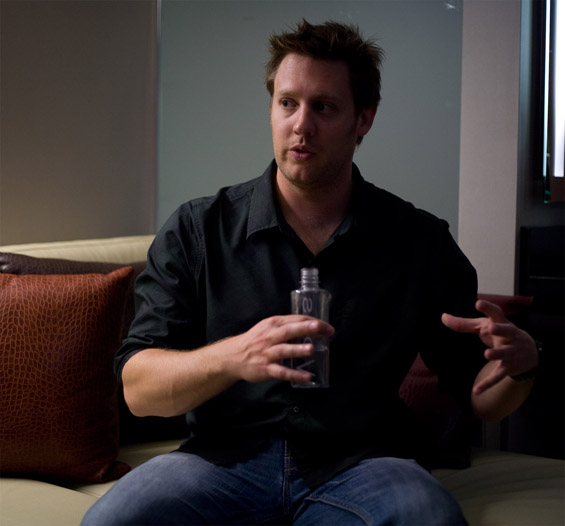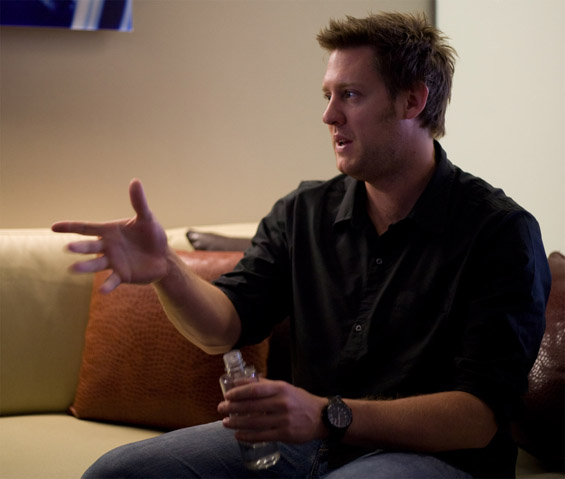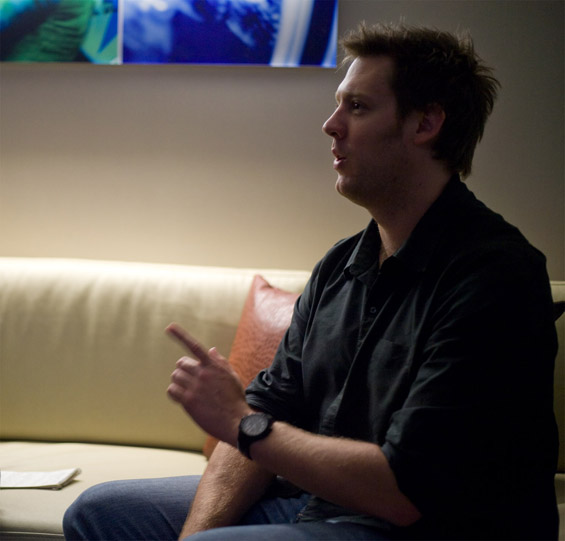Hey everyone. Capone in Chicago here, with some very serious advice about whether or not you should read the following interview.
First off, there are spoilers. It's almost impossible for there not to be, since those of who who haven't seen the Peter Jackson-produced DISTRICT 9, have no idea what it's really about, and that's exactly how it should stay. After the screening of the film we did in Chicago last week, the number-one comment people made to me (aside from telling me how much it kicked ass) was that the film was not at all what they'd expected based on the trailers. That is a deliberate thing by everyone involved in the making of this film about aliens living in the slums of Johannesburg, South Africa.
Director Neill Blomkamp's history is that of a maker of some great short films, most of which are science fiction in nature, including "Alive in Joberg," which served as the jumping off point for DISTRICT 9. He even made a short film based on the video game HALO, which Jackson had hired Blomkamp to direct a feature version of a couple years back before Fox unceremoniously pulled the plug on it.

Capone: Hey man.
Neill Blomkamp: Hello.
Capone: So the two obvious questions that I had were, first, what happened to the interrogation scene that you guys have built the whole teaser trailer around? I was waiting for that moment in the film.
NB: Well, the answer to that is because… We shot a lot of improv-based stuff. We had a very clear script and we had all of the scenes and in certain cases we had dialog written. It was a full-on script, and then once sort of the parameters that were set within the script had been met, we had the ability to seriously get into improv, which was always the goal from the beginning. And in some cases entire scenes were improved, and that would be one of them and you know, I think our shooting ratio was probably far greater than most films, which meant editing was really a laborious process.
Capone: You are actually forming the secondary material story in the editing room. [Laughs]
NB: Right, because like I said, the script was pretty much locked down, but it just meant that we had additional stuff that we had filmed and then shitloads of different types of performances and different takes, hundreds of different takes. When you are in the editing room and you have got your story that you are fallowing and then you have all of this additional stuff, like remember when the guys have the little insect rodents on the ground that he’s talking about where they cut it?
Capone: Sure.
NB: That will be an example of a totally improved thing, right. There are many things like that throughout the film, some of them stay in the edit and then some of them just don’t work, so the interrogation just didn’t work.
Capone: It works in the trailer. That’s one hell of a trailer! The other question that I had, just based on the end of the film is, what happens in three years?
[Both Laugh]
NB: I’m wondering myself, yeah! Shit, I don’t know…
Capone: I don’t think there was a single person there last night who didn’t want to know.
NB: Yeah. There’s a lot of different ways it can go. When we were writing it, we went down some of the roads that were pretty hilarious and some of them were really cool, because it can really go in a lot of different ways, but ultimately I just haven’t thought about where it’s going to end up. I thought so hard about creating the world of DISTRICT 9 and trying to make it feel authentic and real that all of the effort I think went into that, firstly finding that story, because first it was creating a world and you have got this three-dimensional, multi-faceted alternate universe, so you have to find a story within that, because what’s the point of view? Is it the human’s point of view or the alien’s point of view? Whose point of view is it? Once I nailed that down and then started to flesh the story out, that was difficult enough, so any thoughts about what he’s going to do when he comes back is going to be…[waves his had indicating something to be discussed far in the future].


-- Capone
capone@aintitcoolmail.com
Follow Me On Twitter




